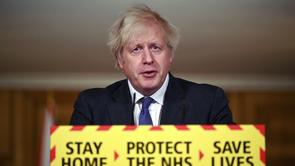 Britain's Prime Minister Boris Johnson speaks during a coronavirus press conference at 10 Downing Street in London on Jan 22, 2021. (LEON NEAL VIA AP)
Britain's Prime Minister Boris Johnson speaks during a coronavirus press conference at 10 Downing Street in London on Jan 22, 2021. (LEON NEAL VIA AP)
The Chinese embassy in the United Kingdom has reacted with disappointment to comments from British Prime Minister Boris Johnson on the origins of the novel coronavirus pandemic, and to claims that World Health Organization investigators may have been impeded.
The embassy also questioned the accuracy of comments from Dominic Raab, the UK's foreign secretary, who had claimed a WHO team may have been denied access to some sites in China
After Johnson told the Reuters news agency on Monday that he thought "it's fairly obvious that most of the evidence seems to point to the disease having originated in Wuhan", the Chinese embassy said on Wednesday that it believes it is more important to allow official investigations to conclude than to speculate about possibilities.
It said energy would be better directed toward fighting the virus that causes the COVID-19 disease than apportioning blame.
The embassy also questioned the accuracy of comments from Dominic Raab, the UK's foreign secretary, who had claimed a WHO team may have been denied access to some sites in China.
READ MORE: WHO: COVID-19 origin-tracing mission in Wuhan independent
An embassy spokesperson said: "Since the outbreak of COVID-19, China has maintained close communication and cooperation with the WHO on the global origin-tracing of the virus in an open and transparent manner."
The spokesperson said China's government has consistently "provided strong support and assistance" to WHO experts visiting China and to the work they are doing. And the spokesperson said the WHO has acknowledged that support.
" (The research) should be carried out by global scientists through collaborated efforts," the spokesperson said. "Such study should be science-based and evidence-based. We should not allow politics to override science, or replace scientific study with unwarranted speculation and deliberate distortion."
'Necessity, urgency'
The spokesperson noted that there have been "a number of clues, reports, and studies" suggesting there were novel coronavirus outbreaks in multiple locations globally in the second half of 2019.
"This reflects the necessity and urgency to send study teams to the relevant countries and regions," the spokesperson said. "The global origin-tracing work may be extended to more places as factual evidence accumulates and science-based hypotheses evolve."
While pointing out that China "strongly opposes" what appears to be attempts by some countries "to politicize the pandemic, play the blame game, and stigmatize China", the spokesperson said the international community should "come together and bring the pandemic under control".
ALSO READ: WHO: Probe of origin should not be 'geographically bound'
"We sincerely hope that countries of the world will adopt a fair, objective and responsible attitude, take concrete actions to support the work of the WHO, and make due contribution to international cooperation on fighting the pandemic and to the building of a global community of health for all," the spokesperson added.
The WHO has also responded to claims about the level of support it has enjoyed in China.
Tedros Adhanom Ghebreyesus, the organization's director-general, said during a news briefing on Friday that the WHO team has, in fact, made very good progress in China and learned a lot about the pandemic but, as yet, does not know when and where it began.
"Having spoken with some members of the team, I wish to confirm that all hypotheses remain open and require further analysis and studies," he said, while noting that the probe will continue and that investigators have "identified areas for further analysis and research".


